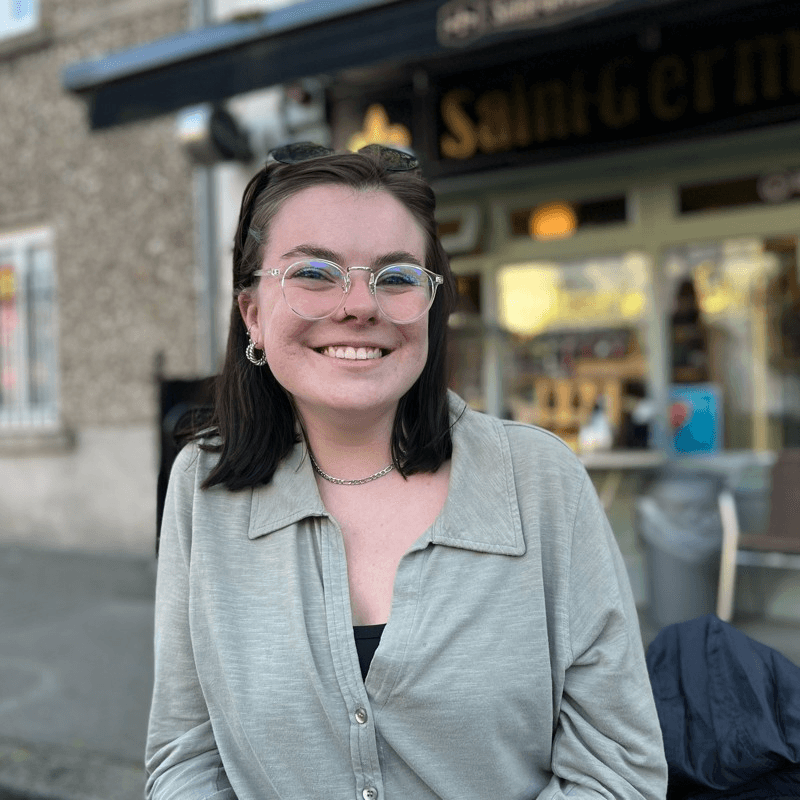
Welcome back to SafeHouse Denver's new series, which explores a typical workday for Advocates across the agency and how their specialized roles support survivors.
Cade Bell is an Advocate in the Adult Program at SafeHouse Denver's Emergency Shelter. Born and raised in Tennessee, Cade comes from a professional background in homelessness services and behavioral health. She has been working with survivors at SafeHouse Denver since 2022.
In her own words, Cade explains how the short-term support provided by the Shelter can make a long-term difference on survivors’ paths to safety, stability and individual empowerment.
“I specifically help those that are 18 and older, which is different from a family Advocate that will help a whole family. I help single individuals start their life again. I connect them with resources to start employment, to start stabilizing their life, we look at housing… but it’s always people without kids. That’s the big difference. In general, advocacy is going to be kind of the same: you’re connecting those who need resources to those resources, and if they need anything extra, we’re here. I think it’s beneficial that we’re here in the Shelter because they live here. They can come to us when they are in crisis or if they need emotional support or if they just need help getting [public] transportation.”
A regular day at the Shelter depends on the composition and needs of current residents. “A lot of days are varied,” Cade said. “I have one [client] who has gotten employment, has been working with Open Door Ministries to find housing and probably is a very strong candidate for our continuum of care into the Extended Stay Program process. It really all depends, but that’s my first client that I’ve gotten [to that point].” An average stay at the Shelter is around 30 days, but it may be shorter or longer depending on how survivors are meeting their self-identified goals. “Every situation is different. Some people stay for like a week, some people stay for their second and third extension,” Cade explained. “Advocacy is varied, but you’re connecting people to resources that will stabilize them and help them grow and move forward.”
What are some of the things that an Advocate will do throughout the day?
“I check my emails, I check in with my clients. We always go to the counseling office to get any updates that aren’t on the shift notes. That’s the same, regardless of the day. That’s my routine. I do my appointments before my phone time. Each Advocate is assigned a couple hours on our Crisis Line each day, and we take it in shifts because that Crisis Line is 24 hours. It always has to be answered, even if it’s not answered upstairs. We say after three rings, answer it in your office. That’s normally my second half of the day [after] taking care of appointments, putting in paperwork, corresponding with everyone else [in the agency].
“Once I’m done with all those tasks, I go upstairs and I answer the Crisis Line. I’m there to be a resource to everyone in the house, whether they need laundry pods or extra shoes or baby items – some things we store up there, so I’m able to get that for them. Because my phone shift is at the end of the day, I normally end my day up there.
“Around 4:00 to 4:30, we’ll have our next individual who’s taking over the next shift – we check in with them, we explain what’s going on in the house that day, anything that they need to know, any [resident] moves. It’s been a little busy here because we’re trying to expand the amount of people that we can offer our services to. We’ve been moving clients to different rooms. We had a woman in an all-gender room, and we want to have that accessible to those of all genders. We really just try to make the space we have here work for as many people as possible.”
What is a recent breakthrough or success story that you have experienced?
“The [support] group I do, I call it Empowerment And Sexuality. It’s basically sexual health and things that survivors need to know. I did eight lessons, so it’s a two-month curriculum. I came up with this from my [college] minor, which was Women, Gender & Sexuality. We start out with the reproductive system; we learn about the parts and functions. What has been a great example is I have them fill out the diagram by themselves. Do you see how this is a problem? That we as a society are so sexualized and then don’t even understand our own bodies? These are things that are crucial for you to know.
“After that, we move on to the sexuality spectrum. I explain what the L, G, B, T, Q, I and A mean; we discuss greetings and pronouns; how to speak to all genders within the spectrum and outside of it. Everything is just an introduction, so I give them the basics and then we can move forward. I did another [session] on boundaries and consent: how to recognize these things, how to say no, how to say a stern no. We also cover birth control.
“Since sexual health is a sensitive topic, I do not force anyone to go to my group. I specifically have a folder out there, and I print out copies of the material that I provide for class. If a woman is curious and they don’t want to come to group, the materials are still available, which has been really helpful. Attendance should be a large goal, but for me, it’s not. This information just needs to be available.
“And then I do [a session] on STDs: what is an STD, the big four [infections]. At the end, I give them a website to research every different type of STD: how they’re transmitted, what they are, the symptoms, and the treatment. My group is about things that people don’t talk about. I also do [sessions] on red flags, stalking, and safety planning. Red flags when you’re dating; red flags within domestic violence and how to notice if it’s getting more serious or the abuse is increasing.
“Then what stalking looks like and how to safety plan. This actually came up from one of our older residents – they’re not [staying] here anymore – but she wanted material on safety planning and how to plan specifically for [stalking]. So that kind of spawned this lesson and expanded it. I gave all of these examples on how to know if you’re being stalked. Some people may not exactly understand the definitions of [those behaviors]. I provide handouts too, so they can fill in the material themselves, or whatever material they care about or want to know.
“The last two [topics] are about women’s healthcare. Women and minorities in general are not taken care of the way the rest of the population is, and I believe women – in intersectional areas or not – need to be prepared for how to stick up for your own body within the healthcare system: what you need to say, what you need to know. We end the curriculum with self-awareness […and…] how to know your own triggers and your own signs of stress, and what you can do with that awareness to calm yourself down or navigate your life better.
“This is my first time I’ve ever written a curriculum, so it’s been a really, really cool experience. We’re working on getting this material at ESP too and getting the group in both spaces, which I think will be really beneficial. Especially for our Extended Stay [residents], where they’re being more independent […and…] trying to re-navigate and restart a life.”
Additional support groups are available around several other important topics. “We also provide Domestic Violence 101, which is the basics,” Cade shared. “Explaining that it’s not just bumps and bruises, that it’s power and control. Explaining how you need to bring up your concern – without being negative toward the relationship – by being trauma-informed. Things like ‘I’m seeing these actions, this is the result. How do you feel, how do you think you should move forward?’ Then we provide Financial Management: how to budget, how to manage your money. We actually have some worksheets that ask ‘What’s your income?’ and help you split it apart [into spending categories] and figure it out to have all the details right in front of you.
“We also provide a general Safety Planning to prepare for any type of situation, and we do that through group [sessions] and with our phone assessments. Safety planning is continual, because someone’s level of safety is going to continually change. Then [family Advocates] do children’s groups. On Sundays and Mondays, they will have the kids come down and do an activity […] providing the [parent] with an hour without the kids to breathe and to care for themselves and have a little bit of a break.”
What does working with survivors mean to you?
“In general, there is help out there, but it’s hard to find. Having an Advocate really helps an individual navigate the system. In reality, the system is so complicated. There are a lot of systems that if you don’t have a case manager or an Advocate, they won’t even look at you. I’ve seen that many times, and they don’t take you as seriously. That’s hard when you’re already suffering from domestic violence. To have an Advocate there who already understands and can tell you where you need to go or the resources that will benefit what you’re looking for, it’s really valuable. I’ve always believed that Advocates are essential to helping those who have less gain more.”
Learn more about SafeHouse Denver’s full continuum of trauma-informed services to support survivors of domestic violence and their children. If you or someone you know is experiencing domestic violence, call our 24-Hour Crisis & Information Line at 303-318-9989. We are here for you!
Follow us on Facebook, Instagram, LinkedIn or YouTube to see Cade discuss more about these important topics!

